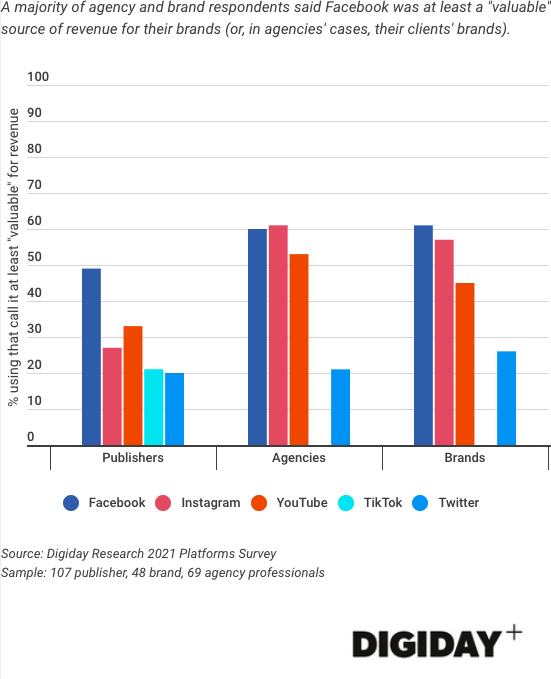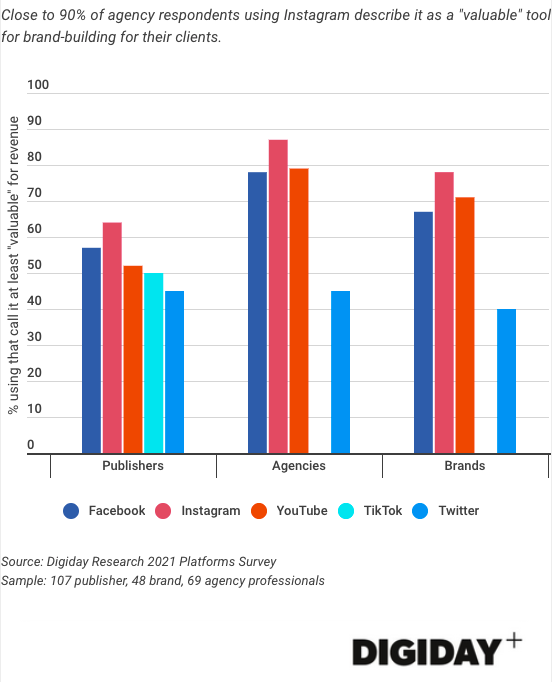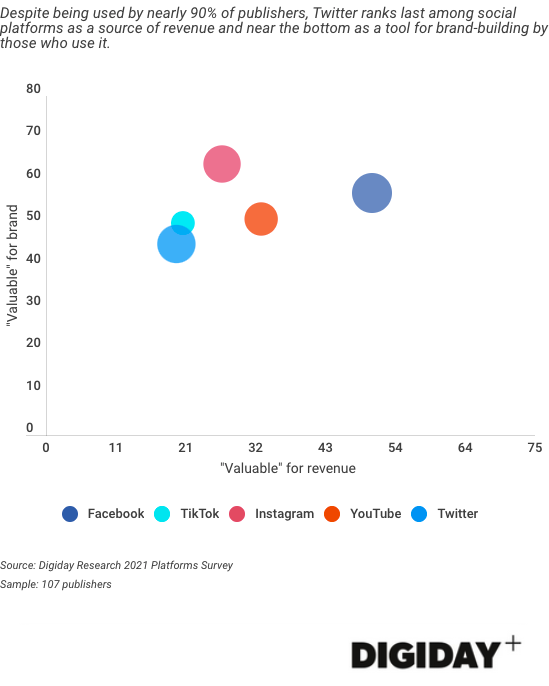Subscribe now and get the latest podcast releases delivered straight to your inbox.
Data: Facebook is No. 1 in revenue value for publishers, Twitter is a bust

By Liz Murphy
Jul 7, 2021

Facebook data at-a-glance for content publishers
New data from the rockstars at Digiday has been released about the value of social media for publishers, agencies, and brands:
- Facebook reigns supreme as almost half of publishers (49%) say the blue social giant is valuable as a source of revenue.
- YouTube came in second with only 33% of publishers saying it was valuable as a source of revenue, and Instagram came in third with 26%.
- When it came to value for brand-building specifically (not revenue), Instagram was ranked first with 64% of publishers and Facebook ranked second with 57% of publishers.
Why this data matters if you're a small business
Social media marketing as a business is a tricky beast.
This is especially true if you've embraced They Ask, You Answer and inbound marketing to drive growth for your company. You know social media should fit into your strategy, right? But how do you do it well?
Too often, you can easily end up wasting your time with flashy social networks that don't matter. Or worse, maybe you're hanging out in the right social spaces, but you don't have a well-scoped, laser-focused strategy in place, so it still feels equally like a waste of time.
And when you're a small to medium-sized business that is publishing revenue-generating content on a regular basis to drive traffic, leads and sales, those can be even more costly mistakes and more of a drain of your resources.
🎓 IMPACT+ course: Fundamentals of social media marketing for businesses
That said, you're not a big brand like Coca-Cola. You don't have the deep benches of social media marketing experts in-house. You're lean by design and you have specific goals. That means you need to focus your efforts where you know you'll see the most return.
So, what does that mean for your social media strategy? Let's be honest, some of you do fall into that category of throwing everything at the wall to see what sticks, with very little to show for it.
Then there are those of you who dabble with social media the way some dabble with inbound marketing – you put in 25% of the effort and then are baffled that you're not seeing 110% of a return, but you just keep pushing forward. Maybe you post a few press releases or a couple of updates here and there, but nothing that really builds an online community.
And finally, there are those of you who have thrown in the towel and don't do social, if you even bothered to at all.
If you fall into either of those three categories, don't shame yourself too much or feel shamed by my call out. You're going to battle with the army you've got, and it's only recently that we've had any real data to help you make smarter decisions about your social media strategy.
🔎 Related resources:
- IMPACT+ course: Creating memorable, money-making content for beginners
- Ultimate guide to online community management for businesses
- 7 best social media management tools for your marketing team
And that, my friends, is why this data matters – it empowers you to make the right decisions and build a social media strategy that is actually strategic.
If you want to drive revenue with social media
Of course, before you can build your social media strategy, you first need to identify what your intended goal is with social media. Social media can help you accomplish a lot – revenue generation, community building, brand awareness, and so on.
But what your top-line goal is will dictate where you focus your efforts the most. For example, looking at that data from Digiday, let's take a look at how different kinds of companies rank the "value" of different social media platforms at driving revenue:
The first obvious takeaway here is the type of business you are will yield different responses as to which social media platforms are the most profitable for you. (FYI, if you're a company publishing content as part of your inbound marketing strategy, you're a publisher.)
For publishers, there is no contest here, because 49% of publishers reported that Facebook is either "valuable" or "extremely valuable" in driving revenue. In contrast, Twitter (which I know grabs a lot of headlines) is actually driving the least ... even below TikTok.
If you're brand-building on social media
Now, let's say you're more wanting to build a community and generate awareness around your brand. That's a much different goal than driving revenue, even if they are related. So, it should be no surprise that the perceived value for brand-building of different social networks is not the same as for revenue, according to Digiday:
Similar to revenue reporting, Twitter is still at the back of the pack. Otherwise, the playing field is much more level for all companies, with Instagram leading the way in terms of brand-building value across all categories.
Let's take a moment for Twitter, actually
I've said it before, and I'll say it again.
Just because a social media platform is making legitimate headlines in the value it's providing for large portions of its audience does not mean it is worth your time as an inbound marketer publishing content for a small to medium-sized company. It's not.
And Twitter is the absolute perfect example of that, now backed by data from Digiday:
Seriously, it doesn't get any more cut and dry than this:
“Despite being the second most commonly used platform — 94 out of the survey’s 107 publishers had posted content to Twitter in the past 30 days — just one-fifth of the publishers that use Twitter said the platform was at least a 'valuable' source of revenue.” (Source)
Of course, this picture may change since Twitter wants to double its revenue to $7.5 billion by the end of 2023.
Quite frankly, I don't see how they do that effectively without figuring out a way to make the platform valuable to the most prolific content creators of all: publishers. As someone with her own personal brand, I love the stuff they're innovating, features-wise, for individual and independent creators.
But as someone who also works for a publisher, I'm curious when we're going to have our day to shine.
A few other stray observations
- TikTok is nonexistent for agencies and brands for brand-building and revenue. Are they just not experimenting because they don't yet see the value?
- Agencies and brands on the whole see more brand-building value in social media across the board (Twitter and TikTok being the exceptions). Is it because they are able to put more of an investment behind it and have the experts in-house to wring the most out of those platforms, whereas publishers may not?
- YouTube coming in second for publishers in revenue but third for brand-building is interesting. What is the difference in strategy there? Are videos being published to YouTube that drive revenue but don't bring brand awareness?
- Related to that, is it hard for publishers to find the bandwidth to create a dimensional business video strategy on YouTube that accomplishes both revenue goals and brand-building?
I have one question, however, that looms above all of these stray observations: Is the perceived value (or lack thereof) a characteristic or fault of the platforms themselves, or the social media strategy (or, again, lack thereof) that we're attempting to execute within them?


Order Your Copy of Marcus Sheridan's New Book — Endless Customers!


